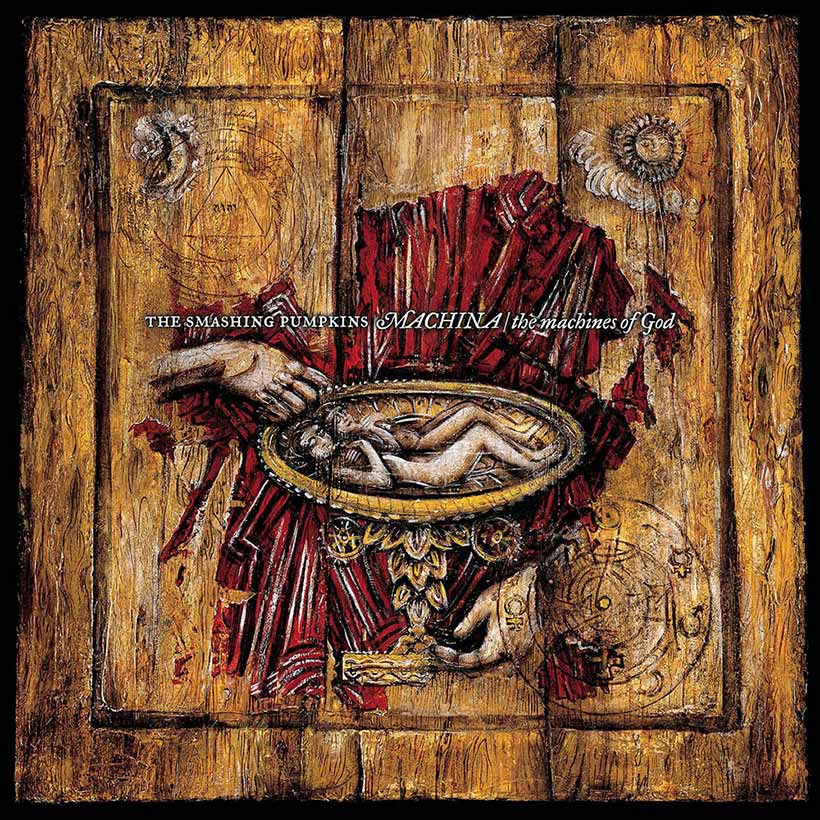To quote the Chicago Sun-Times, The Smashing Pumpkins’ fifth album, Machina/The Machines Of God, was – and remains – “an exceedingly impressive and hard-driving record.” However, while it undoubtedly contained some of the band’s most resonant music, it sold relatively modestly and has become somewhat overlooked among the Pumpkins’ wider oeuvre.
Listen to Machina/The Machines Of God on Apple Music and Spotify.
“A really dark album about loss”
In retrospect, Machina… would have been the ideal follow-up to the Chicagoan stars’ magnum opus, 1995’s colossal, diamond-certified Mellon Collie And The Infinite Sadness, had fate not dictated otherwise. Tragically, during that record’s subsequent tour, keyboardist Jonathan Melvoin died and drummer Jimmy Chamberlin was sacked, resulting in frontman Billy Corgan taking the band down a different path with 1998’s Adore: an understandably grief-stricken, electronic-tinged record that impressed critics but divided the Pumpkins’ fan base.
Stung by the reaction to Adore and struggling to deal with the recent death of his mother, Corgan vowed that The Smashing Pumpkins’ next album, Machina/The Machines Of God would be their final statement. He was equally determined, however, that the record would be made by the band’s classic line-up, including Jimmy Chamberlin, to whom he hadn’t spoken in almost three years.
“I reached out to Jimmy and asked him to return to the band,” Corgan told Uncut in 2011. “I said we should get the four of us in a room, make a good album, tour, and then put it to bed. Jimmy was open to it – but the others weren’t so keen.”
Nonetheless, the Pumpkins began work on Machina… with Adore’s co-producer, Flood, late in 1998. They arranged Corgan’s new songs in their practice space and at the Chicago Recording Company studio. However, after they completed a short US tour in April 1999, bassist D’arcy Wretzky quit the band, citing the desire to embark on an acting career. As a result, Corgan himself played most of the basslines on the album.
“We had to make a very different kind of record”
Corgan later told Uncut that Wretzky’s departure “obviously put a stress on the integrity of the record,” with producer Flood adding, “We decided that we were going to have to make a very different kind of record. We pretty much went back to the drawing board. Certain songs on the record are survivors from that first period, but it meant a shift in the ways songs had to be formed.”
Corgan had originally envisioned Machina/The Machines Of God to be a lengthy concept album based around an imaginary, Ziggy Stardust-esque rock star named Zero. However, while the band eventually signed off on enough material for a double-album (Corgan later self-released the sequel, Machina II/The Friends And Enemies Of Modern Music, online), Machina/The Machines Of God was trimmed back and issued by Virgin Records as a single-disc album on February 29, 2000.
In contrast to the introspective Adore, Machina… harked back to the attacking, guitar-driven approach of the Pumpkins’ legend-enshrining records, with a fair portion of the tracklist reserved for dense, abrasive rockers such as the album’s lead single, “The Everlasting Gaze,” the intense, ten-minute “Glass And The Ghost Children” and the grinding, aptly-titled “Heavy Metal Machine.”
As with Mellon Collie…, however, Machina… was a particularly satisfying listen because there was just enough light to leaven the shade of Corgan’s heavier material. “Age Of Innocence” and the atypically upbeat “With Every Light” (“The sun is beaming, radiating all the love that we are creating”) reminded listeners that the Pumpkins’ leader was often at his best penning glorious ballads, while “This Time” revealed he still had the touch when it came to dashing widescreen pop anthems.
Elsewhere, Machina… yielded two more memorable singles, courtesy of the propulsive, New Order-esque “Try Try Try” and the brooding, but ultimately joyous “Stand Inside Your Love.” The latter song, written for Corgan’s then-girlfriend, Yelena Yemchuk, was arguably the most direct love song he’d ever written – and sounded all the more affecting for it.
“The people that get into it really get into it”
For the most part, the critics agreed that Machina… was the sound of The Smashing Pumpkins regaining their mojo. Q magazine dubbed it “a wonderful rock album,” while The Daily Telegraph suggested that “Corgan seems re-energized as a writer and singer.” The Chicago Sun-Times went one better, simply declaring it to be the band’s “masterpiece.”
On release, Machina/The Machines Of God went up against big-selling titles from fast-rising new alt.rock acts ranging from Jimmy Eat World to Korn and Limp Bizkit, yet it still held its own, securing Top 10 placings on both sides of the Atlantic and procuring a further brace of gold discs for Billy Corgan’s team.
Corgan made good on his promise to split the band late in 2000, yet Corgan and Chamberlin reformed the Pumpkins seven years later, opening a new chapter with that same year’s Zeitgeist.
“Machina was a really dark album about loss and very hard to get into, but the people that get into it, they get really into it,” Corgan told Florida’s Palm Beach New Times in 2010.
“What’s nice is that bands that are popular now come up to me and talk about how they like that album and it’s had an influence on some of the music that’s been made in the past five or six years – so that’s been cool!”



